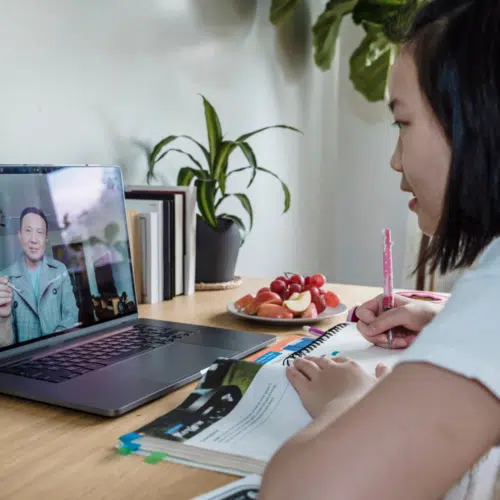Who’s Helping You Homeschool? 10 Places to Find Support
Who’s helping you homeschool? You may be overwhelmed at the thought of doing it all, but there’s good news! You don’t have to. Learn how to find your homeschool support system!
These post-pandemic days, when I mention that we homeschool, I don’t think it’s my imagination that I’m met with many shiny new looks of respect. And I know it’s not my imagination that I’ve been met with more responses like, “I could never do that,” “I like the idea of homeschooling, but I couldn’t make it work in the spring (2020),” and, “You must really be on top of it.”

Side note: Can we trust memes as an accurate reflection of culture? I truly don’t know. . . but I like to think we can:

As nice a boost as this “#postrona homeschool awe” can be (and as much as I love being compared to Wonder Woman), the truth is that I’m not really some “on-top-of it,” superhuman. My days are not a perfectly checked off to-do list. Each one is a balancing act, and sometimes things get dropped! Most importantly though, I don’t do everything alone. I don’t even try.
The more I think about it, the more I realize that many of the busy homeschooling parents I know frequently “outsource” aspects of the homeschooling day in ways that are big, small, and everything in between. As a work-from-home homeschooling mom with a variety of interests, I am grateful for the people and resources that allow me to prioritize balance in the midst of homeschooling.
So today, I’m talking about 10 types of homeschool help that homeschooling parents frequently rely upon for support. Whether you already have helpers in your homeschool life or you are currently looking for some ways to take some pressure off your day, I’m encouraging you to use this list to check in and ask yourself, “Who’s Helping You Homeschool?”
Who’s Helping You Homeschool? 10 Places to Find Support
1. Your Spouse or Significant Other
You knew this was going to be first, didn’t you? If you have a loving relationship with a spouse or significant other, that’s the first place you can go to ask for homeschool help.
“Now wait,” you might be thinking, “I’m in charge of homeschooling, and I know that handing stuff over to my spouse would just make things too complicated.”
But even if that is the case, there are still plenty of ways your significant other can help out, such as:
- Working with the kids to learn more about a special-interest topic
- Playing educational games (or even educational video games) with the kids during evenings or weekends
- Being an active participant in road trips or weekend field trips
- Getting involved with extracurricular activities (sports, creative endeavors, church group outings, etc.)
- Reading together in the evenings
In our family, my husband does some homeschooling during the weekends. Since he and my daughter share an interest in flight and space exploration, he gives her lessons on those topics during his time at home.

2. Extended Family
I’m incredibly grateful to have extended family (both near and far) that I love and trust. I know that’s not the case for everyone. However, if you’re close with your extended family, too, consider some ways that they can be involved in your children’s homeschooling.
If they live close by:
- Occasional or regular childcare: This could happen in various ways, but one suggestion is that a relative might watch after a little one while you work with your older children. This could be done regularly (for example, one afternoon or one day a week) or on special occasions when you and the older children have a special project or science experiment to complete.
- Special interest learning: If you have a relative who is passionate about a hobby or skill, see if they can come “guest lecture,” or teach that subject regularly!
- Driving kids to practices and being involved with extracurriculars: This can be so meaningful for family bonding and it also gives you some free time.

If they live far away:
- Set up a regular phone or Facetime date: This simple act teaches consistency and shows respect for family members of all ages. That’s totally valuable and educational in my book. Or maybe the relative could use the phone or Facetime date to read a book with your child or discuss with your child what he or she is learning, etc. Your child could even use these meetings to practice giving an oral report or presentation.
- Get them writing letters: Make a far-off family member a pen pal! Work that handwriting! Sharpen those subject/verb agreements! Plus, getting something in the mail is exciting for kids, and getting something other than bills is exciting for grown-ups!
- Ask for help with supplies: If your family members want to be involved with the kids’ education, make sure they are up-to-date on all current interests and learning. If they want to help financially, let them! Maybe there’s a chemistry set to be bought or a monthly app subscription that would help the kids and you, or a set of Nancy Drew novels on your wish list! Let them know!
If you want more specific ideas on how to involve extended family, especially grandparents, be sure to check out this article sharing ways grandparents can help homeschool.
3. Your Local Co-Op
Are you involved with a homeschooling co-op or group? I’m very loosely defining “co-op” for this post as “a group of homeschooling families that have come together to support homeschool learning.” Homeschooling co-ops can vary in terms of what they do and what they offer.
Some co-ops mainly focus on field trips and social events. Other variations offer a full line-up of streamlined course curricula. At any level, they can be a great resource for “outsourcing your homeschool!” (Keep in mind that many co-ops require active participation by parents. There are some, though, that offer paid classes and activities and don’t require parent participation. Be sure you know what you’re signing up for before you make any kind of commitment.)
4. Friends
Whether your child’s friends are homeschooled or not, time with friends can be an important (and even educational) part of your child’s homeschooling! As the homeschooling parent of an only child, I feel like social time with friends is something that can and should be a part of my daughter’s routine as much as possible. And because two of her best friends are also homeschooled, playtime and educational activities sort of naturally tend to overlap when they spend time at each other’s homes.

However, we do a lot of educational field trips with our homeschooled and non-homeschooled friends and get together to do arts and crafts, too. These sorts of activities, while technically “supplemental,” are a super valuable part of our homeschool experience that is a pleasure to “outsource.”
I know that many homeschooling parents of older children also like to switch off with formally homeschooling each other’s kids once a week (or every other week), which is fun for the kids and gives parents some extra time, too.
5. Technology
Confession: when my daughter was younger, I was that anti-screen mom. Now that she’s school-age, I’ve made some compromises to that initial stance. Technology can give us precious time when there’s no other help available. Also, I’ve learned more about some of the cool educational apps, and even educational television, that’s out there.

These days, I feel okay about incorporating a little bit of technology into her routine during “independent time.” My husband is a gamer and also likes to play educational (kid-friendly) video games with her. I had reservations about that at first, but now that I’ve been able to see her learning and enjoying it (and having quality time with her Daddy doing something they both enjoy), I’ve come around.
And, if you want to avoid screens but still incorporate technology, did you know there are some great STEAM podcasts for kids? I love that listening to podcasts allows kids to listen and do something quiet with their hands at the same time.
I have a friend whose kids enjoy listening to podcasts while they build with Legos or blocks or while they create with Perler beads or Shrinky Dinks. (My friend says the frosted Shrinky Dinks – instead of the clear sheets – are best and that Prismacolor pencils are perfect for making them beautiful and colorful.) You’ll be surprised at how much information your kids retain from listening and having busy hands at the same time!
Now, maybe you’re the anti-screen (or anti-technology) mom and this one offends you. That’s okay. I get it. It’s not for everyone. There are great homeschooling parents who are anti-tech while others are pro-tech, and some (like me) are somewhere in between. While I try not to use educational apps and TV all the time in our homeschool, there are many times when I’m very grateful for it as a backup plan! I know I’m not alone!
6. Online Classes and Dual Enrollment
Online classes combine technology with personalized instruction, making them a valuable source of homeschooling help, particularly if you work from home or have older kids! I’m going to be honest here: assuming we’re homeschooling when my daughter is in high school, online classes are definitely on the table. (Upper-level math and science, I’m looking at you!)

Many homeschooling parents use online classes to help their children learn a subject that they simply aren’t comfortable with teaching. Online options for math, for instance, can be a lifesaver! You can even find quality online instruction for extracurricular learning, like art or drama. As we move further into the digital age, I also think that online classes are potentially good preparation for college and professional careers.
Speaking of college, another noteworthy source of homeschool help (that overlaps somewhat with online classes) is dual enrollment! Many homeschoolers who are finishing up high-school-level courses enroll in their local college and earn college credits at the same time. I’ve known a lot of homeschoolers who did this, and it was a great way for them to gain confidence and knock out core classes at the same time.
7. Extracurricular Activities
Most homeschooling families I know (including myself) are all about integrated life/learning. An important “helper” for this aspect of homeschooling often comes via extracurricular activities! The opportunity that homeschooling kids have to be able to whole-heartedly pursue and learn about things that interest them is one of my favorite things about homeschooling. I think it helps develop a lifelong love of learning!
Extracurricular activities can also provide a way for your kids to make friends and experience learning from different types of instructors. Whether our kids are interested in volunteering at the animal shelter, learning karate, or taking a cake-decorating class, homeschool parents know that extracurricular involvement is helping them develop important life skills as well as learn more about who they are (and who they want to be)!

8. Church and Volunteer Opportunities
For many homeschooling parents, spiritual and moral development are just as important as academic development, and these things are often best learned in a community environment! Church can therefore be a very important homeschool helper providing a place for homeschooled kids and teens to learn, get involved, meet mentors, and find a network of supportive friends.
Similarly, many homeschooling families encourage their kids to take an interest in volunteer opportunities, which can help them learn to think of others and find ways to give back to the world. Church and/or volunteer involvement are wonderful homeschool helpers that have to do with “heart learning” (not just head learning).

9. A Private Tutor
Sometimes you may just need someone else to come into your house (or Zoom into your laptop) and work with your child one-on-one in a particular area. There are many reasons you might want a private tutor whether you have a child with a disability, a teen who is struggling with calculus, or because you are a working and/or single parent.
On a budget? It doesn’t always have to be expensive. This is when it’s handy to be part of a co-op or have some friends who also homeschool! You might know a homeschooling mom who’d be willing to teach your high schooler American history if you teach her twelve-year-old art. (You never know until you ask!) Or maybe you have a relative who will tutor your child for free (or for not very much). Tutors can be a valuable source of assistance to homeschooling families from all walks of life.
10. Home Helpers
Lastly, sometimes you need help in your homeschool, but it has more to do with the home part than the school part. I think this still qualifies as “homeschool help”! When you’re overwhelmed, getting help in your home can give you the peace of mind you need to better focus on teaching (and the many other things you have to do). Here are a few different types of help that homeschooling parents often use to tackle the “home” aspect of homeschooling:
- Meal planning/prepping: This one is an easy, budget-friendly way to help make life easier for yourself, particularly if you are the cook in your family. I’m a “wing it” kind of cook, myself (AKA “Hmmm…what can I make with what’s in the fridge?”) However, I’ve recently started doing more prep work with ideas from my new favorite cookbook (Cook Once, Eat All Week). When I follow the plan, it makes life that much easier. Some of you homeschooling rockstars have meal plans for the month! You astound me, and I applaud you.
- A robotic vacuum: Are you laughing? I’m not kidding. A self-charging automatic vacuum cleaner can change your life. Ask anyone who has one, especially if they have pets.
- Mommy’s Helper: Hiring someone to come play with/keep an eye on your little ones while you work with the older kids can be hugely helpful. Such helpers can often be found in responsible pre-teens who are a little too young to babysit alone but are eager to gain some experience. If you get someone like this to help you out, keep in mind that they are often willing to babysit for less, too (because they don’t have 100% responsibility and it’s a good experience for them as well).
- Chore charts: You can’t do everything! Many homeschooling parents know that making household “to-dos” a consistent requirement for an ongoing “home economics course” is a smart way to delegate while also teaching kids and teens important life skills.

These are just a few of the many available “homeschooler helpers” that you can use to get support, supplement academics, or maybe even just get a little “me time” in your day. And hey, maybe we homeschooling parents really are superheroes. However, it’s good to remember that even Wonder Woman didn’t always work alone. She had the Justice League and a whole team of Amazons to back her up! After all, even heroes work better when they have a little help.
Who or what are some of your most prized “homeschool helpers?” Drop a comment and tell us!
You May Also Like:
- How to Spot a Homeschooler by the Things We Say!
- 5 Fun Places to Homeschool
- How to Effectively Cut Off Communication with Your Children
- How to Build a Ladybug House
Katie Gustafson has been a member of the world of “weird, unsocialized homeschoolers” for a long time–first as an alumnus and now as a homeschooling mom to a fiercely fun little girl! She’s very into anything creative, especially writing, dancing, and painting. She’s also particularly passionate about literature and owns more books than she will probably ever be able to read. However, she reassures herself with the belief that, in the event of a digital apocalypse, she’s cultivating a much-needed physical library for future generations. Katie is happy to contribute articles to Weird Unsocialized Homeschoolers, Hip Homeschool Moms and Sparketh. She also has a personal blog on writewhereuare.com.






